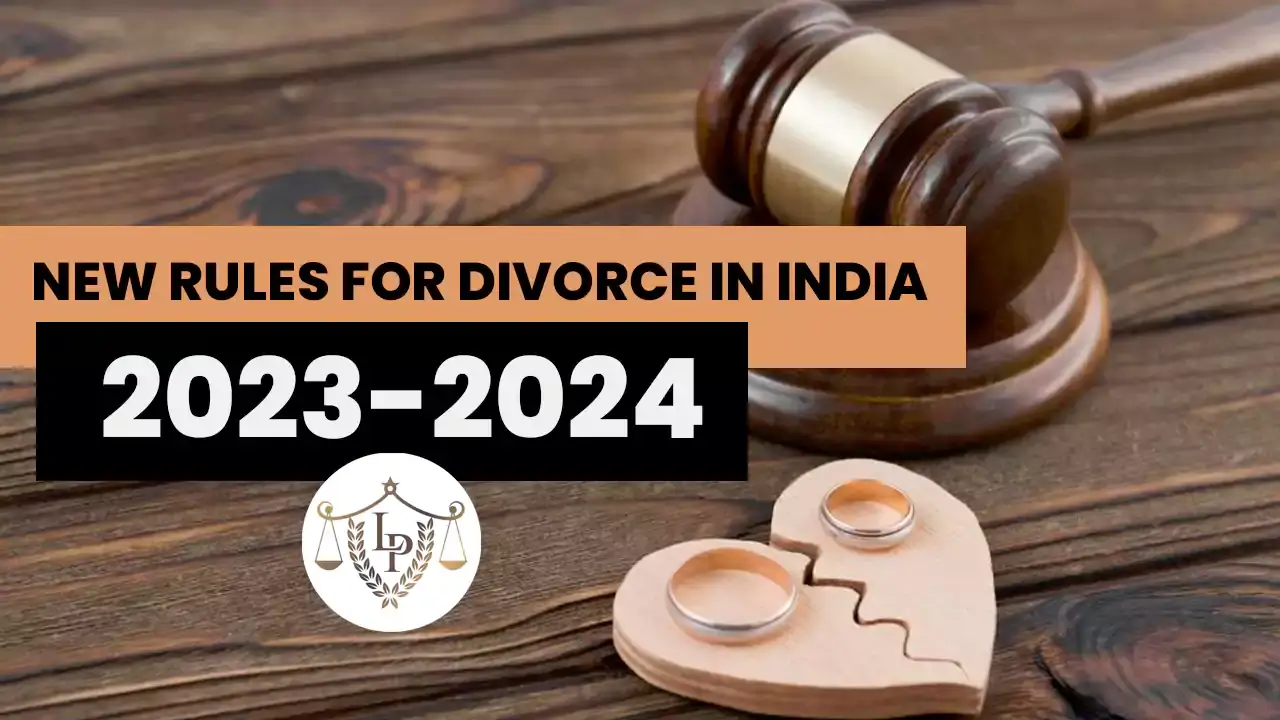New Rules For Divorce In India 2024
 Law Phrase 18-01-2024
Law Phrase 18-01-2024

Table Of Contents:
New rules for divorce in India 2024 bring a contemporary dimension to the country's legal landscape. In 2024, the evolving framework reflects societal shifts, incorporating the diverse needs of a dynamic population. These new rules for divorce in India 2024 aim to streamline the legal processes, addressing concerns outlined in the Hindu Marriage Act of 1955, the Special Marriage Act of 1954, and other applicable legislations. As couples navigate through this legal terrain, understanding the intricacies of these new rules for divorce in India 2024 becomes crucial for a seamless transition.
What are the Legal Grounds For Divorce In India?
Legal grounds for divorce in India play a pivotal role in shaping the dissolution of marriages within the country's diverse legal landscape. As of 2024, these grounds, rooted in various personal laws, encompass a spectrum of reasons that validate the termination of a marital union. Understanding these grounds is crucial for individuals navigating the complexities of the legal system.
- Cruelty: One of the prominent legal grounds for divorce in India 2024 is cruelty. This pertains to the infliction of physical or mental suffering by one spouse upon the other, making cohabitation intolerable. The term encompasses both physical violence and emotional abuse, providing a substantial basis for seeking legal separation.
- Adultery: In the context of legal grounds for divorce in India 2024, adultery remains a significant factor. When one spouse engages in a consensual sexual relationship outside the marriage, it constitutes a breach of marital vows and provides grounds for seeking a divorce. Adultery is considered a violation of the marital contract, justifying the dissolution of the union.
- Desertion: Desertion stands as another crucial element among the legal grounds for divorce in India 2024. When one spouse voluntarily abandons the other without consent and without reasonable cause, it serves as a legitimate basis for seeking divorce. The deserted party can petition for the termination of the marriage on the grounds of abandonment.
- Forcible Conversion: Forcible conversion is a nuanced inclusion among the legal grounds for divorce in India 2024, reflecting the diverse religious fabric of the nation. If a spouse is subjected to coercive measures aimed at changing their religious beliefs, it constitutes grounds for seeking a legal separation, highlighting the importance of religious freedom within the marriage.
- Mental Disorder: Mental disorder is recognized as a legitimate ground for divorce in India 2024. If a spouse suffers from a mental illness that renders cohabitation impossible or leads to the breakdown of the marriage, it provides a basis for seeking legal dissolution. The well-being of both parties is considered paramount in such cases.
- Incurable Diseases: Among the legal grounds for divorce in India 2024, incurable diseases hold significance. If a spouse is afflicted with a disease deemed incurable and poses a threat to the physical or mental well-being of the other, it can be cited as grounds for seeking divorce. This underscores the legal system's acknowledgment of health as a crucial aspect of marital stability.
Legal Process and Prerequisites
In the context of how to file a divorce in india, the steps involved, as of the new rules for divorce in India 2024, follow a structured path that aims to ensure fairness and justice.
- Filing a petition: Initiating the divorce process involves filing a petition before the appropriate court. As per the new rules for divorce in India 2024, this document outlines the grounds for divorce, the desired relief sought, and other essential details, serving as the foundation for the legal proceedings.
- Serving the petition: After filing, the next step, according to the new rules for divorce in India 2024, involves serving the divorce petition to the other party. This ensures that both spouses are aware of the legal proceedings, fostering transparency in the divorce process.
- Response and counterclaim: Once served, the responding party has the opportunity to submit a response or counterclaim. The new rules for divorce in India 2024 emphasize the importance of providing a fair chance for both parties to present their side, fostering a balanced legal environment.
- Evidence and arguments: Subsequent stages involve presenting evidence and arguments supporting the claims made in the divorce petition. The new rules for divorce in India 2024 stress the need for a thorough examination of evidence to ensure a just and equitable resolution.
- Mediation or counseling: In line with the new rules for divorce in India 2024, courts may encourage mediation or counseling to facilitate amicable settlements. This step emphasizes alternative dispute resolution methods, aiming to minimize the adversarial nature of divorce proceedings.
- Decree of divorce: If mediation proves unsuccessful, the court will proceed to issue a decree of divorce. This final step, as per the new rules for divorce in India 2024, formalizes the end of the marital union and outlines the terms and conditions of the divorce, including matters related to alimony, child custody, and division of assets.
Throughout this legal process, the new rules for divorce in India 2024 prioritize efficiency, fairness, and the well-being of all parties involved. Adhering to these guidelines ensures a more streamlined and compassionate approach to divorce proceedings, aligning with the evolving needs of individuals navigating the complexities of marital dissolution in contemporary India.
Recent Updates or Amendments In 2024
In 2024, India has witnessed significant strides in its legal landscape concerning matrimonial dissolution, marked by the introduction of new rules for divorce. These amendments reflect a contemporary approach to marriage dissolution, aiming to address the evolving needs of individuals while ensuring fairness and protection of rights. Here, we delve into the recent updates and amendments in 2024 that shape the divorce process in the country.
- No-fault divorce: One notable development in the new rules for divorce in India 2024 is the introduction of a no-fault divorce system. This paradigm shift allows couples to seek divorce without necessarily establishing fault or wrongdoing. Instead, the focus is on the irretrievable breakdown of the marriage, simplifying the process and potentially reducing acrimony between the parties.
- Mandatory mediation: Another key aspect of the new rules for divorce in India 2024 is the emphasis on mandatory mediation. Courts may now require couples to undergo mediation before proceeding with the divorce process. This proactive approach encourages amicable resolution, fostering an environment that prioritizes dialogue over adversarial litigation.
- Simplified divorce procedures: The new rules for divorce in India 2024 introduce simplified procedures to streamline the legal process. This includes the digitization of documentation, making it more accessible and efficient for couples navigating the divorce proceedings. The aim is to reduce bureaucratic hurdles, ensuring a more straightforward and expeditious resolution.
- Protection of women’s rights: Addressing gender dynamics, the new rules for divorce in India 2024 place a heightened emphasis on the protection of women’s rights. Amendments ensure fair and equitable treatment, particularly in matters of alimony, property division, and child custody. These changes align with broader efforts to promote gender equality within the legal framework of divorce.
- Awareness and Counselling Programs: Recognizing the emotional toll of divorce, the new rules for divorce in India 2024 advocate for comprehensive awareness and counseling programs. These initiatives aim to educate couples about the legal implications of divorce, promote mental health during the process, and provide resources for effective co-parenting post-divorce. Such programs contribute to a more informed and resilient society.
Conclusion
Considering all the information provided, comprehending the relevant laws and procedures in divorce cases can be challenging for applicants. An adept lawyer plays a crucial role in assisting them to grasp the specific grounds for divorce in India that are applicable to their situation, providing guidance throughout the entire process.

